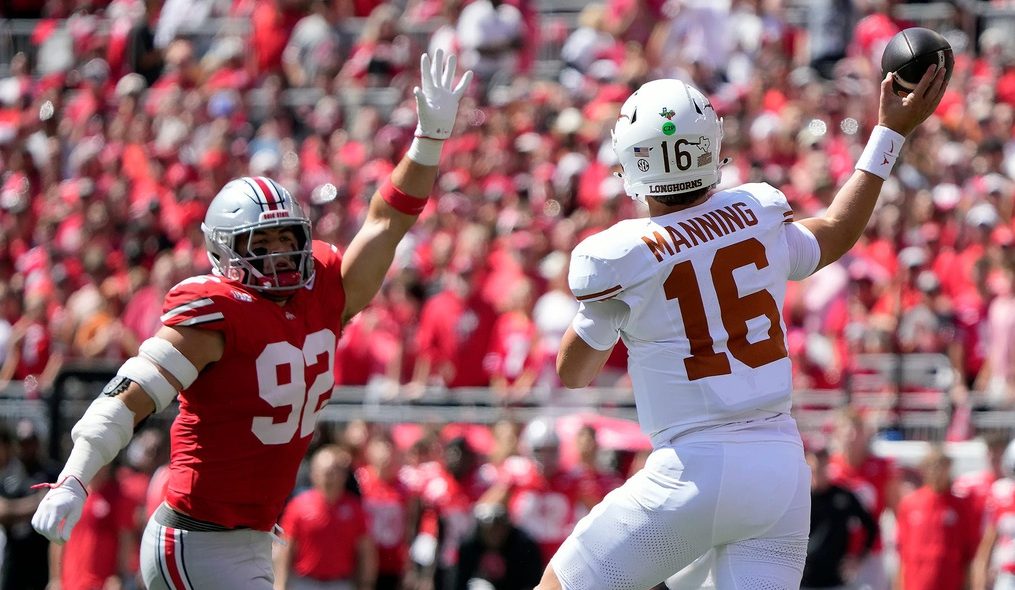By: Liam O’Gorman-Hoyt

501(c)(6) TAX EXEMPTIONS: CLOSING THE LOOPHOLE THE NFL JUST EXPOSED
“To give away money is an easy matter and in any man’s power. But to decide to whom to give it and how large and when, and for what purpose and how, is neither in every man’s power nor an easy matter.” — Aristotle[1]
INTRODUCTION
You, an organization, oversee one of the biggest entertainment industries in the world; an industry generating an estimated revenue of over $9 billion annually.[2] In 2011 you signed deals granting television rights to NBC, CBS, FOX and ESPN totaling $42 billion in revenue over the course of the contracts.[3] Your top ranking official earned over $74 million between 2012 and 2013.[4]
You also enjoy another interesting and not commonly acknowledged perk: you do not pay taxes and are classified as a tax-exempt, “not for profit” organization.[5] Who are you? You are the National Football League (NFL).
It is important to note that the tax exemption previously enjoyed by the NFL (it has since been voluntarily relinquished) only applied to the league office, not the 32 NFL teams that generate individual revenue (those teams pay taxes).[6] The league office oversees the administrative duties of running a professional football league, as in hiring and paying league officials and referees, as well as running events like the NFL’s draft.[7] The league office is also responsible for paying the league’s owners and lobbyists.[8]
The NFL is not the only professional sports league that had tax-exempt status. Presently, the National Hockey League (NHL) and the Professional Golf Association (PGA) are also tax-exempt.[9] Major League Baseball (MLB) dropped its tax exemption in 2007.[10] In contrast, the National Basketball Association (NBA) has never been tax exempt.[11]
Currently, section 501(c)(6) of the Tax Code grants tax-exempt status to “business leagues, chambers of commerce, real-estate boards, boards of trade and professional football leagues.”[12] The NHL and PGA Tour fall within this 501(c)(6) category for tax exemption purposes.[13] The “professional football leagues” category was added to the Tax Code in 1966.[14] The NFL has been tax exempt since 1942.[15] However, neither the NFL nor the Internal Revenue Service claim to be in possession of the original paperwork that was filed for the League to become tax-exempt.[16]
In a surprise move in April 2015, the NFL announced its decision to voluntarily give up its tax-exempt status and to begin paying taxes, opting to become a “for-profit” organization.[17] It is not completely clear why the NFL decided to forgo its tax-exempt status.[18] From the outside, it appears the NFL made this decision because it no longer wanted to be forced to disclose its financial records to the public, as is required by all non-profits.[19] Seemingly, by dropping the exemption, the League would also no longer have to adhere to the conditions of a tax-exempt entity, such as the requirement of “not to engage in a regular business of a kind ordinarily carried on for profit.”[20]
It is anticipated that this move will make the League more opaque, because the NFL will no longer need to disclose Commissioner Roger Goodell’s salary and other financial information.[21] In a memo to the NFL’s 32 teams, Commissioner Goodell stated, “the effects of the tax exempt status of the league office have been mischaracterized repeatedly in recent years.”[22] What Goodell is likely alluding to here, and which is quite important to point out, is that the tax exemption the NFL is forgoing only applies to the actual league offices; not the 32 NFL teams that generate most of the NFL’s $9 billion in annual revenue.[23]
Over the years actions from Congress, including recent legislation from Senator Tom Coburn, have threatened to revoke the NFL’s tax exemption.[24] Senator Coburn argues that by giving an exemption to one organization, a burden will be created for someone else, and in this case, “working Americans are paying artificially high rates in order to subsidize special breaks for sports leagues.”[25] Through voluntarily forgoing its exemption, the NFL will be able to preempt any future legislation or threats against it, thus removing any leverage Congress could hold over the organization.[26]
Attempting to avoid legislation is not the only potential reason why the NFL’s surrendering of its tax exemption raises questions. Commissioner Goodell’s statement that “the filing status decision to relinquish its tax-exemption and begin paying taxes will make no material difference to our business” raises an important issue regarding the organization and operating structure of the NFL.[27] Contrary to Goodell’s statement, it would seem there should be a material difference between organizations operating “for-profit” and those that are “not for profit.” As stated above, one of the requirements necessary to receive an exemption is that the entities “not engage in a regular business of a kind ordinarily carried on for profit.”[28] It seems counterintuitive that the League would voluntarily choose to pay taxes if it is already organized in a manner that doesn’t require it to pay taxes. If the NFL makes no material changes to how it operates as an organization, at least from a business and tax standpoint, then it seems that the League should still be considered a tax-exempt entity and should still be required to satisfy the requirements of having an exemption.
On its face, opting out of one’s tax exemption, voluntarily, does not seem to make a lot of sense, at least not without further facts of the reason behind the decision. The transition the NFL made from tax-exempt to taxable does not occur very often.[29] In fact, the Internal Revenue Service (IRS) has not established any governing procedure for when an organization voluntarily transitions from “tax-exempt” to “taxable.”[30] That is what this Note will argue, that a framework and exit tax should apply to a tax-exempt organization that chooses to opt-out of its tax exemption requirements.
Most notably, the intent behind giving a tax exemption is for the organization to receive a benefit because it is providing a public good.[31] A tax exemption should not be provided to an organization to be used solely for its economic benefit, and then shed when it is no longer beneficial to the business. Here, it seems that the NFL has gotten a “head start” on the competition by being tax-exempt for the last 73 years. The League has been able to use the money it saved from not paying taxes to build its business and its brand. Now, the League becoming the athletic and entertainment monolith that it is, wants to drop its tax exemption so that it no longer has to abide by its requirements. With an organization as large and notorious as the NFL giving up its tax exemption, the time is right for this issue to be addressed and the Tax Code to be revised, in order to prevent this kind of abuse in the future.
This Note argues that a change needs to be made to current tax exemption laws in the U.S. Tax Code. Section I of this Note will examine the history and purpose of tax exemptions in the United States; with the purpose of such exemptions being to assist organizations that are providing a benefit to the public or to an organization’s members.[32] Section II will address the history of the NFL’s tax exemption, which it received by being classified in the same section as business leagues.[33]
Section III of this Note will argue that the NFL received an unquantifiable benefit as a result of receiving its exemption; that the NFL was able to survive a financial collapse because of its tax exemption and that the League has gone on to thrive, at the expense of the Taxpayers.[34] Section IV of the Note suggests a change to the U.S. Tax Code, through legislation, that will require a tax-exempt organization to recompense the taxpayers by paying an exit tax to the IRS when an exempt organization chooses to forgo the tax exemption’s requirements.[35] Section IV also discusses the doctrine and equitable rule of unjust enrichment, and how a comparison can be made that the League has been unjustly enriched through use of a tax exemption.[36]
By implementing an “exit-tax” for organizations making the transition to “for profit” status, the IRS will be able to ensure that an organization will not be unjustly enriched through its enjoyment of a tax exemption, and that taxpayers will not bear the burden of economically supporting an organization that uses a tax exemption solely for economic gain.
I. OVERVIEW, HISTORY, AND DEVELOPMENT OF THE TAX-EXEMPT SECTOR IN THE UNITED STATES
Granting tax exemptions to certain organizations is not a new practice. The concept of granting tax exemptions can be traced back to the British Statute of Charitable Uses of 1601.[37] Throughout history, ingrained in the relationship between governments and taxpayers, there always have been certain organizations that were “off limits to the tax collector” because their private, charitable activities served the public need.[38] The United States Supreme Court, when considering the purposes served by exemptions, found “[c]haritable exemptions are justified on the basis that the exempt entity confers a public benefit — a benefit which the society or community may not itself choose or be able to provide, or which supplements and advances the work of public institutions already supported by tax revenues.”[39]
Despite varying standards regarding qualifications for exemptions, many tax-exempt organizations share common characteristics.[40] For example, most exempt organizations are prohibited from “private inurement,” meaning the nonprofit’s money or other assets may not be devoted to private uses by insiders instead of the charitable purposes they were intended for.[41] Tax-exempt organizations are also subject to rules regarding lobbying and political campaign activities.[42]
Even though an organization has a tax exemption, it still must pay taxes on “unrelated business income.”[43] This type of income can also be confusing. In general, an exempt organization may acquire revenue from four sources: (1) contributions, gifts, and grants; (2) trade or business income that is related to exempt activities; (3) investment income; and (4) trade or business income that is not related to exempt activities.[44] Customarily, the Federal income tax exemptions extend to the first three categories, but do not extend to an organization’s unrelated trade or business income.[45]
An examination of the history of exemptions will provide a better understanding of why exemptions are used and the purpose they serve. This section will detail different pieces of legislation and laws that have shaped how modern tax-exemptions came to be. This section will also discuss the purpose and intent of tax-exemptions, and the history of the NFL and its tax-exemption.
A. The Importance of Tax Exemptions in Society
The tax-exempt sector in the United States predates the formation of the republic.[46] Without an established governmental framework, early settlers formed charitable and other “voluntary” associations, such as hospitals, fire departments, and orphanages.[47] In 1874, Harvard University’s President Charles William Eliot declared that a proposal to revoke Massachusetts’ charitable exemption laws was both “illogical and mean.”[48] The proposal was illogical, Eliot reasoned, because “if churches, colleges and hospitals subserve the highest public ends, there is no reason for making them contribute to the inferior public charges,” and mean because it “deliberately propose[d] to use the benevolent affections of the best part of the community as a means of getting out of them a very disproportionate share of the taxes.”[49]
Tax exemptions play an important role in many fundamental aspects of society. For some organizations, an exemption may be granted based on the nature of its activities.[50] Charitable activities, or activities providing a public benefit, may be viewed as governmental in nature and therefore should not be subject to taxation.[51] This can explain exemptions for charitable organizations, social welfare organizations, and state and local governments.[52] Alternatively, the granting of tax exemptions can encourage the promotion of certain activities, like arrangements to provide employee benefits or arrangements for individuals to save for health, retirement, and education.[53]
Traditionally, the reasoning behind granting tax exemptions is that the Government should subsidize nonprofit organizations that provide a good or service that is undersupplied by the market.[54] When addressing the NFL, it would seem that the good or service the League provides is one of entertainment; the displaying of professional athletes battling one another in an athletic contest that is broadcast for the world to enjoy.[55]
B. Legislative History of Tax Exemptions
The structure of the current tax exemptions granted to the charitable and voluntary sector outlined in the United States Tax Code was developed through legislation enacted between 1894 and 1969.[56] Early tax regulations developed around three major principles. First, organizations operating for charitable purposes were granted exemptions from the Federal income tax.[57] Second, charitable organizations were required to be free of private inurement.[58] Third, an income tax deduction for contributions was developed and designed to encourage charitable giving.[59]
Several significant pieces of legislation are important when studying the history of tax exemptions. The Wilson-Gorham Tariff Act of 1884 provided an exemption for “corporations, companies, or associations organized and conducted solely for charitable, religious, or educational purposes, including fraternal beneficiary associations.”[60] Ultimately this Act became famous for income tax provisions later found unconstitutional by the Supreme Court.[61]
The Revenue Act of 1913, also called the Underwood Tariff Act, established an income tax system with tax exemptions for certain organizations, most notably for the Chamber of Commerce.[62] The Chamber of Commerce appeared before the Senate Finance Committee during its deliberations because it was concerned that the existing exemptions would not protect nonprofit business groups.[63] This Act also included an exemption for organizations devoted to social welfare, the precursor to today’s Internal Revenue Code 501(c)(4).[64] Later, the Revenue Act of 1943 required the first Forms 990 (the income tax return form used by tax-exempt organizations) to be filed; these are the same forms in use today.[65]
Today, the tax exemption for nonprofit corporations is found in 26 U.S.C. § 501.[66] Subsection (a) of the statute states, “[a]n organization described in subsection © or (d) or section 401(a) shall be exempt from taxation under this subtitle…”[67] The NFL receives its tax exemption under subsection ©(6), which states “business leagues, chambers of commerce, real-estate boards, boards of trade, or professional football leagues (whether or not administering a pension fund for football players), not organized for profit and no part of the net earnings of which inures to the benefit of any private shareholder or individual.”[68] The NFL as an organization falls into the category of “professional football leagues,” which are considered tax-exempt by the IRS.
C. 501(c)(6) — Business Leagues
The NFL, as a “professional football league,” is listed under the 501(c)(6) statute, in the same class as business leagues.[69] The predecessor to 501(c)(6) “business leagues” was enacted as part of the Tariff Act of 1913.[70] While there is no legislative comment on the statute, it has been assumed that its passage was the result of a U.S. Chamber of Commerce request for an exemption for nonprofit “civic” and “commercial” organizations.[71]
When the 501(c)(6) exemption was first enacted in 1913, there were only 750 business leagues with annual, collective revenues of $60 million.[72] By 1995 that number had increased to more than 25,000 organizations with $19.5 billion in total revenue.[73] Providing a tax break to organizations generating nearly $20 billion in revenue was likely not foreseeable to Congress when it passed the 1913 tax exemption.[74]
Section 501(c)(6) of the Internal Revenue Code provides for the exemption of business leagues, as well as chambers of commerce, real estate boards, boards of trade and professional football leagues.[75] To qualify for an exemption under this statute as a “business league,” organizations must meet certain requirements contained in Treasury Regulation 1.501(c)(6)-1.[76] To satisfy the requirements of the Regulation, and achieve “business league” status, the court in Bluetooth SIG Inc. v. United States formulated a 6-prong test.[77] An organization must be an association:[78]
(1) of persons having a common business interest; (2) whose purpose is to promote the common business interest; (3) not organized for profit; (4) that does not engage in a regular business of a kind ordinarily conducted for profit; (5) whose activities are directed to the improvement of business conditions of one or more lines of business as distinguished from the performance of particular services for individual persons; and (6) of the same general class as a chamber of commerce or a board of trade.[79]
It must be pointed out that the third requirement, “not organized for profit,” means that the organization is only prohibited from issuing shares of stock that carry the right to dividends, not that it cannot have net earnings in the form of an excess of income over expenses.[80] Currently, it is unclear whether all 501(c)(6) organizations must meet the requirements set forth in Bluetooth in order to receive and maintain a tax exemption, as the language in that case seems only to apply to “business leagues.”[81]
II. THE NFL’S TAX-EXEMPT HISTORY AND LITIGATION
The NFL was founded on September 17, 1920, by a group of men who gathered in Canton, Ohio.[82] The League was first known as the American Professional Football Association (APFA), but was renamed the NFL in 1922.[83] From the time of its inception until 1942, the NFL was a taxable entity.
A. The Original League Exemption
By 1942 the League was in its twenty-third season and struggling financially.[84] The League needed to find ways to save money and to protect its employees, the players.[85] With many of its players off fighting in World War II, the NFL filed for tax-exempt status from the IRS.[86] Presumably, this was done to prevent the League from financially collapsing and so that the players would have a place to play and could return to their jobs when they came home from the war.[87] The NFL’s application was accepted.[88] Through this action the League, which was then based in New York, became categorized as a trade association and thus was qualified to be tax exempt.[89] This categorization would become increasingly more important as the League became more successful and more profitable.[90]
B. “Professional Football Leagues” Added to the Tax Code in 1966
In 1966, when the NFL was about to merge with the American Football League (AFL), then-Commissioner Pete Rozzelle lobbied Congress to make sure the League would continue to maintain its tax-exempt status.[91] What took place during this lobbying is unclear, but in exchange for putting a football team in New Orleans, Rozelle received support from a pair of Louisiana lawmakers to put language into an unrelated bill that explicitly categorized football leagues as tax-exempt.[92] One of those lawmakers, Senator Russell Long, was notorious for his influence over the tax code.[93] The tax exemption was located conveniently in an unrelated session law that was mostly concerned with collecting taxes on real estate.[94] The language “professional football leagues” is tucked away at the bottom of the Act.[95]
The Act, as it related to professional football leagues, had both antitrust and tax provisions.[96] The antitrust provision was enacted to allow the NFL and AFL to merge without being in violation of the Clayton Antitrust Act or the Federal Trade Commissions Act.[97] The language was amended in the Internal Revenue Code to ensure that the football league’s exemption would not be in jeopardy if the League administered a players’ pension fund.[98] This was important for tax-exemption purposes as the administering of players’ pension funds could be seen as a form of inurement, as the players would be benefitting from revenue that the tax-exempt organization had generated that was then placed in the pension funds.[99]
The League enjoyed this tax shelter until April 2015.[100] As recently as 2009, the IRS conducted an extensive audit of the league office and concluded that it was fully in compliance with the laws governing tax-exempt entities.[101] This exemption saved the League millions in taxes over the years.[102]
III. THE NFL HAS “PLAYED THE SYSTEM” WITH ITS TAX EXEMPTION: ENJOYING THE ECONOMIC BENEFITS OF THE EXEMPTION AND NOW FORGOING ITS REQUIREMENTS, AS THE EXEMPTION IS NO LONGER NEEDED
The NFL has chosen to voluntarily forgo its tax exemption, and to begin paying taxes.[103] It should be questioned if an organization should be able to do this. A distinct issue arises when an organization chooses to go from “tax-exempt” to “taxable” status. That issue being whether the organization should simply be allowed to “forgo” the requirements of the exemption and begin paying taxes without penalty. Surprisingly, the IRS does not provide any protocol or guidelines for an organization to follow when it chooses to make this transition.[104]
Even though the League has voluntarily “given up” its tax exemption, it should not be allowed to merely forgo the exemption’s conditions without penalty. An organization seemingly organized “not for profit,” and one that is granted an exemption because of a public good or service that it provides, should face an economic penalty if it chooses to become “taxable” and forgo the tax exemption’s requirements. An organization should not be allowed to abuse the tax exemption process by abiding by an exemption’s requirements only for as long as the exemption is economically beneficial to the organization and then forgoing the requirements when it no longer needs it.
In order to prevent this from occurring in the future, legislation should be passed creating a framework for an organization to use when it chooses to make this transition, with the main requirement being an “exit tax” paid by the organization to the IRS for the time it spent being tax-free.[105] By enforcing an exit tax on transitioning organization, the IRS will be able to help prevent future tax-exempt organizations from “playing the system” by using an exemption strictly for economic purposes.
A. Because the NFL was Granted a Tax Exemption, Allowing the League to Survive Financial Difficulties and Eventually Flourish, the League is Indebted to the Taxpayers
The purpose of granting a tax-exemption is to support the activities of an organization that is providing a benefit to the public.[106] It is doubtful that a tax exemption is granted solely for the economic benefit of an organization, to pick and choose when to use the exemption in a way that is beneficial to its activities.[107] But seemingly that is what the NFL has been permitted to do by dropping its tax exemption; it is casting aside the requirement of disclosing its financial information to the public and is looking out for its own self-interest.[108] Analysts have speculated, and Commissioner Roger Goodell even stated, that the NFL chose to forgo its exemption because it was a “PR headache.”[109] The League has been scrutinized for years for its tax exemption, and the voices of those displeased with the League have only gotten louder with the disclosure of the Commissioner’s $44 million a salary.[110]
One seemingly important issue those commenting on the NFL’s tax exemption are failing to discuss is the likelihood that the League was able to use the money it saved from being tax exempt and to reinvest that money back into the organization, or to use it for other “non-tax” purposes.[111] By not requiring the NFL to pay taxes, the League arguably was able to get a “head start” on other organizations or sports leagues that were required to pay taxes. The League is now “playing the system” and dropping the exemption and its requirements; because the League no longer needs to be tax-exempt in order to survive.
As a result of having a tax exemption, the NFL received numerous benefits over the years.[112] It is estimated that the League has enjoyed tax breaks worth more than $100 million since first receiving the exemption.[113] However, it is important to point out that the League office usually spends all the money it receives each year on legitimate business expenses, and at the end of a normal year there’s no income left to tax.[114]
B. Process in Which the Exemption Process was Abused
The process in which the League abused the tax exemption system took place in the following manner. First, in 1942 when the League was struggling financially, it applied to receive an exemption, which was granted.[115] Then, after receiving the exemption, the League would have been able to build and expand the organization using money that it would have spent on taxes. Interestingly, either through acquisition from a rival league, or through expansion on its own, the NFL has admitted 27 different teams and franchises since 1942.[116] Not all of these franchises are still with the league, but this figure evidences the fact the NFL has indeed been able to grow since 1942.[117]
Now, 73 years after first being granted the exemption, the League has decided that it no longer wants to abide by the requirements, or deal with the PR headaches, that come with being a tax-exempt organization.[118] But that is not how the tax exemption system should work. An exemption is granted because the organization is providing a public good; a good that society does not, or cannot, provide for itself.[119] An exemption is not granted merely to help an organization survive economically challenging times, and then be cast aside when the exemption is no longer beneficial; at least it shouldn’t be.
Critics of this analysis may argue that there is nothing wrong with this decision, that the League “played by the rules” during its time of being exempt, and it will now be paying taxes since it has voluntarily given up the exemption. That may be well and true, but the point that is missed is that the League may not have survived if it was not granted the exemption. It is documented that the League was struggling financially, thus it is entirely possible to speculate that the granting of the exemption was crucial for the League to survive.[120] Even though this potential “granting of life,” which allowed the failing organization to survive and expand, might not be quantifiable, it is important to recognize that it was a significant benefit that was conferred on the League through the granting of the tax-exemption. By enabling the League to continue, and even flourish, the granting of the tax exemption has indebted the NFL to society. This is why a change needs to be made to the Tax Code, to ensure that an organization in the future will not be able to abuse the tax exemption system in the same way the NFL has.
IV. AN ORGANIZATION SHOULD HAVE TO GIVE BACK TO SOCIETY WHEN IT VOLUNTARILY FORGOES ITS TAX EXEMPTION
An exit tax will require an organization to pay the IRS, and in essence, society as a whole, for the benefits it has enjoyed by being tax exempt. It is estimated that as a result of the NFL giving up its tax exemption, it will pay about $10 million per year in taxes.[121] The League has been tax-exempt for 73 years; a lot of time to avoid the burden of paying taxes. Even if the league only paid half of those taxes, $5 million a year for 73 years, the total would be $365 million.[122] That is a $365 million dollar bill that, essentially, the United States taxpayers have been footing. The League should have to pay an “exit tax” to make up for all of the years that it was exempt and received taxpayer subsidies.[123] If the League no longer wants to adhere to the requirements that are expected of a tax-exempt organization, then the NFL owes taxpayers something in return for “carrying its weight” all of these years.[124]
With an organization as notorious as the NFL, it is important that this issue is addressed now. By allowing the NFL to make this transition and abuse its tax exemption without penalty, a dangerous precedent will be set for organizations to follow in the future. The addition of an exit tax will act as a deterrent, both before an organization is granted an exemption and also while the organization has the exemption. If an organization has notice of an exit tax before applying for an exemption, it will not be able to “play the system” and only use the exemption for as long as it is useful for it. Subsequently, once an organization has a tax exemption, it will be on notice that it faces a stiff penalty if it chooses to become “for profit.”
A. Institution of an Exit-Tax
When a business league does not comply with the requirements expected of a tax-exempt organization, it faces penalties, fines, or potentially having to pay “back taxes.”[125] It is thus logical that an organization that “voluntarily” chooses to become “for profit” is not complying with the parameters of being tax-exempt and should face a similar kind of penalty. A tax exemption is a privilege, not a right, and when an organization has benefitted from having such a privilege, it must follow the guidelines that are expected of it.[126]
Although this is a problem that does not occur regularly, with an organization as notorious as the NFL making the transition from being “tax-exempt” to “taxable,” the time is right for changes to be made to the Tax Code that will regulate this event.[127] Legislation should be adopted making organizations aware that if they choose to organize as “not-for-profit” and be tax-exempt, they will incur steep penalties for electing to change course and become “for profit.”
By requiring an organization to pay an “exit tax” to the IRS, along with having to continue to submit a tax return, the goal of having taxpayers recompensed for supporting such organizations will be accomplished. An exit tax also will regulate the tax-exempt sector by not allowing organizations to take advantage of an exemption for purely economic purposes. Requiring disclosure of the organization’s tax return will allow the IRS, and the public, to be able to see what changes the organization made in its operating structure as it makes its transition. Implementing these requirements will help ensure that a “tax exempt” organization will use its exemption for the public benefit, not just to benefit itself when it is economically feasible.
B. The Unjust Enrichment Doctrine
The rationale of an exit tax can be compared with the theory of unjust enrichment. Unjust enrichment is a general equitable principle that no person should be allowed to profit at another’s expense without making restitution for the reasonable value of any property, services, or other benefits that have been unfairly received and retained.[128] The consequence of a liability in restitution is that the defendant must either restore the benefit in question (or its traceable product), or else pay money in the amount necessary to eliminate unjust enrichment.[129] In order to establish a claim for unjust enrichment the plaintiff must prove three elements: (1) the plaintiff conferred a benefit upon the defendant; (2) the defendant had an appreciation or knowledge of the benefit; and (3) the defendant accepted or retained the benefit under circumstances making it inequitable for the defendant to retain the benefit without payment of its value.[130]
In the future, a tax-exempt organization choosing to opt out of the tax exemption’s requirements would be required to pay an exit tax for the time the organization spent being tax exempt. An exit tax would allow for an organization to recompense the IRS, and in essence, the taxpayers, for both the tangible and intangible benefits the organization incurred through being tax-exempt. Theoretically, in comparison with the unjust enrichment theory, an organization would have to pay for the time it spent being tax exempt, thus not getting a “free ride” and using the exemption for purely economic reasons, as it seems the NFL has done.
C. Proposed Legislation to the Tax Code
The following language should be added to the Tax Code regarding the transition of a tax-exempt organization choosing to forgo its tax exemption:
26 U.S.C. 501 ©(6)(a) — Voluntary Exemption Relinquishment
(a) In the event that an organization shall voluntarily forgo its tax exemption, and organize itself “for profit,” that organization shall:
(i) Pay, to the IRS, 50% of the combined total tax amount that the organization would have paid each year it was exempt as if it had been taxed as a “for profit” entity.
(ii) Continue to submit an annual tax return to the IRS for public record for three continuous years starting from the time the exemption was forgone.
By adding this legislation to the Tax Code, tax-exempt organizations like the NFL will no longer be able to “play the system” and use a tax exemption solely for the organization’s economic benefit. If the organization chooses to forgo its exemption, it will have to “give back” some of the benefits it received during its time of being tax-exempt.
V. CONCLUSION
There is currently no procedural framework or regulation process enabling the IRS to oversee the transition of a tax-exempt organization choosing to forgo its tax-exempt status. Because there are flaws in the tax exemption granting process, and because there are legal implications for when an organization chooses to transition, the IRS should implement an exit tax as a way to better regulate the tax-exempt sector.
Through the implementation of an exit tax, an organization will not be able to voluntarily relinquish its tax exemption and its filing requirements when the exemption is no longer economically beneficial to the organization without facing a monetary penalty. An exit tax will also help compensate for any tangible or intangible benefits an organization gained during its time being tax-exempt. An organization will either have to continue operating as the tax-exempt, not-for-profit organization that was originally granted the exemption, or it will have to pay a significant exit tax to recompense for the time the organization benefitted from not having to pay an income tax.
[1] Patricia Illingworth, Thomas Pogge & Leif Wenar, GIVING WELL: THE ETHICS OF PHILANTHROPY 3 (2011).
[2] Monte Burke, How The National Football League Can Reach $25 Billion In Annual Revenue, FORBES (Aug. 17, 2013, 6:30 AM), https://www.forbes.com/sites/monteburke/2013/08/17/how-the-national-football-league-can-reach-25-billion-in-annual-revenues/.
[3] Id.
[4] Eric Chemi, Does Roger Goodell Truly Deserve $74 Million?, BLOOMBERG BUSINESS (Sept. 12, 2014), https://www.bloomberg.com/bw/articles/2014-09-12/does-roger-goodell-really-deserve-74-million.
[5] Nina Mandell & Nate Scott, Why the NFL probably won’t lose its tax-exempt status, USA TODAY (Sept. 23, 2014, 8:50 AM), https://ftw.usatoday.com/2014/09/nfl-tax-exempt.
[6] Will Hobson, The NFL says its 2014 tax bill would have been $0, and that’s not as outrageous as it seems, THE WASHINGTON POST (May 1, 2015), https://www.washingtonpost.com/news/sports/wp/2015/05/01/the-nfl-says-its-2014-tax-bill-would-have-been-0-and-thats-not-as-outrageous-as-it-seems/.
[7] Id.
[8] Id.
[9] Michael McCann, NFL drops its tax-exempt status, but other pro associations will benefit, SPORTS ILLUSTRATED (Apr. 29, 2015), https://www.si.com/nfl/2015/04/28/nfl-drops-tax-exempt-status.
[10] Rob Stott, NFL Commissioner To Team Owners: We’re Dropping Our Tax-Exempt Status, ASSOCIATIONS NOW (Apr. 30, 2015), https://associationsnow.com/2015/04/nfl-commissioner-team-owners-dropping-tax-exempt-status/.
[11] Andrew Zimbalist, The Nonprofit Status of Sports Leagues Is Irrelevant, N.Y. TIMES (Sept. 4, 2014, 12:59 PM), https://www.nytimes.com/roomfordebate/2014/09/03/should-pro-sport-leagues-get-tax-breaks/the-nonprofit-status-of-sports-leagues-is-irrelevant.
[12] 26 U.S.C. 501(c)(6).
[13] Kristi Dosh, Examining NFL’s Tax-Exempt Status, ESPN (June 6, 2013), https://espn.go.com/nfl/story/_/id/9342479/examining-nfl-tax-exempt-status-challenged-us-senator-tom-coburn.
[14] Act of Nov. 8, 1966, Pub. L. №89–800, 68A Stat. 163.
[15] Mike Slack, Tax-Exempt No Longer: The NFL’s Tax History and Future, BLOCK TALK BLOG (Apr. 30, 2015), https://blogs.hrblock.com/2015/04/30/tax-exempt-no-longer-the-nfls-tax-history-and-future/.
[16] Matt Blitz, Why The NFL Is Tax-Exempt, TODAY I FOUND OUT (Jan. 29, 2014), https://www.todayifoundout.com/index.php/2014/01/nfl-tax-exempt/.
[17] Sean Gregory, Why the NFL Suddenly Wants to Pay Taxes, TIME (April 28, 2015), https://time.com/3839164/nfl-tax-exempt-status/.
[18] Id.
[19] Jordan Weissmann, The NFL Is Not a Nonprofit, SLATE (Sept. 18, 2014, 2:18 PM), https://www.slate.com/articles/business/moneybox/2014/09/the_nfl_should_lose_its_tax_exempt_status_the_league_is_not_a_nonprofit.html.
[20] Internal Revenue Service, Business Leagues, https://www.irs.gov/Charities-&-Non-Profits/Other-Non-Profits/Business-Leagues.
[21] Benjamin Snyder, A huge change is coming to the NFL, FORTUNE (Apr. 28, 2015, 2:15 PM), https://fortune.com/2015/04/28/change-nfl-tax/. (Bloomberg News speculating that primary reason for the NFL making this decision was to allow the league to operate without having to publicly report its financial information).
[22] Brent Schrotenboer, By dropping tax-exempt status, NFL can avoid disclosing Roger Goodell’s salary, USA TODAY (Apr. 28, 2015, 9:48 PM), https://www.usatoday.com/story/sports/nfl/2015/04/28/nfl-tax-exempt-status-roger-goodell-drop-salary/26543647/.
[23] Id.
[24] Ira Boudway, A Republican Senator’s Lonely Mission to Make the NFL Pay Taxes, BLOOMBERG (Sept. 19, 2013), https://www.bloomberg.com/bw/articles/2013-09-19/a-republican-senator-s-lonely-mission-to-make-the-nfl-pay-taxes.
[25] Id.
[26] Joseph Stromberg, Why the NFL just gave up its nonprofit status: to escape scrutiny, VOX (Apr. 28, 2015, 3:50 PM), https://www.vox.com/2015/4/28/8509767/nfl-tax-exempt-nonprofit.
[27] See Snyder, supra note 21.
[28] Internal Revenue Service, Business Leagues, https://www.irs.gov/Charities-&-Non-Profits/Other-Non-Profits/Business-Leagues.
[29] Ama Sarfo, Smaller Leagues Likely Winners In NFL Tax Status Change, LAW 360 (May 7, 2015, 3:52 PM), https://www.law360.com/articles/651769/smaller-leagues-likely-winners-in-nfl-tax-status-change.
[30] Id.
[31] Oliver A. Houck, With Charity For All, 93 Yale L.J.1415, 1422 (1984).
[32] See infra Part 1A, B & C (describing the history of tax exemptions as well as tax exemption legislation in the United States).
[33] See infra Part II (discussing the history of the NFL and its tax exemption as well as unjust enrichment).
[34] See infra Part IIIB (arguing the NFL was able to financially survive and get a head-start on the competition at the expense of the IRS and Taxpayers).
[35] See infra Part IVA, B (proposed legislation to be added to the Tax Code for when an organization transitions from tax-exempt to for-profit).
[36] See infra Part IVC (Discussing the legal concept of Unjust Enrichment and comparing it with the NFL’s tax exemption).
[37] Joseph J. Thorndike, Tax History: Original Intent and the Revenue Act of 1913, TAX ANALYSTS (Sept. 26, 2013),https://www.taxhistory.org/thp/readings.nsf/ArtWeb/C82515A4B6B7A24C85257D1B0041C86E?OpenDocument. (Some analysts claim that practice of granting tax exemptions for societal purposes began at this time).
[38] See Houck, supra note 31.
[39] Bob Jones Univ. v. United States, 103 S. Ct. 2017, 2028 (1983).
[40] Joint Committee on Taxation, Historical Development and Present Law of the Federal Tax Exemption for Charities and Other Tax-Exempt Organizations (JCX-29–05), April 19, 2005, https://www.jct.gov/x-29-05.pdf.
[41] 26 U.S.C. 501(c)(6); https://www.jct.gov/x-29-05.pdf.
[42] 26 U.S.C. 501(c)(3); https://www.jct.gov/x-29-05.pdf.
[43] 26 CFR 1.501(c)(6)-1; https://www.jct.gov/x-29-05.pdf.
[44] 26 CFR 1.501(c)(6)-1; https://www.jct.gov/x-29-05.pdf.
[45] 26 CFR 1.501(c)(6)-1; https://www.jct.gov/x-29-05.pdf.
[46] Paul Arnsberger, Melissa Ludlum, Margaret Riley, & Mark Stanton, A History of the Tax-Exempt Sector: An SOI Perspective, STATISTICS OF INCOME BULLETIN (Winter 2008), https://www.irs.gov/pub/irs-soi/tehistory.pdf.
[47] Id.
[48] Oliver A. Houck, With Charity For All, 93 Yale L.J. 1415, 1422 (1984). Quoting: C. Eliot, The Exemption from Taxation (1894) (paper delivered to the Commissioners of the Commonwealth of Massachusetts), quoted in Bittker & Rahdert, The Exemption of Nonprofit Organizations From Federal Income Taxation, 85 YALE L.J. 299, 332 (1976).
[49] Id.
[50] See Joint Committee on Taxation, supra note 41.
[51] Id.
[52] Id. (Some examples of these organizations include the YMCA, Goodwill, The Smithsonian Institution, The Susan G. Komen Foundation, and the American Bar Association).
[53] Id.
[54] Paul Caron, Hackney: Why Section 501(c)(6) Trade Associations Are Undeserving Of Tax Exemption, TAXPROF BLOG (Dec. 17, 2015), https://taxprof.typepad.com/taxprof_blog/2015/12/hackney-why-section-501c6-trade-associations-are-undeserving-of-tax-exemption.html.
[55] WISEGEEK, What is the NFL?. https://www.wisegeek.com/what-is-the-nfl.htm.
[56] See Joint Committee, supra note 41.
[57] Id.
[58] Id., See Joint Committee, supra note 41.
[59] Id. (Explaining that an organization must not give its income to anyone related to the organization).
[60] See Thorndike, supra note 38.
[61] Id. (The Wilson Gorham Tariff Act’s original purpose was to lower tariffs substantially. However, while the bill was in the House, a Tennessee representative, Benton McMillan, amended the Act to include an income tax. Litigation on the constitutionality of the income tax commenced almost immediately after the tax became law. In a consolidation of several separate cases, in Pollock v. Farmers’ Loan and Trust Co. (1865), the Supreme Court ruled that the income tax as applied to rents earned on real property was an unconstitutional direct tax on that property. The Court also held, on federalism grounds, that the federal government lacked constitutional authority to tax income from state government bonds. The decision declared the entire statute unconstitutional, as the Court determined that enforcing the remaining portions of the law was inconsistent with the intent of Congress).
[62] See Joint Committee on Taxation, supra note 41. See Thorndike, supra note 38.
[63] Id.
[64] Janie Har, Did 1913 Revenue Act prohibits political organizations from claiming tax exempt status?, POLITIFACT (Jun. 13, 2013, 4:00 AM), https://www.politifact.com/oregon/statements/2013/jun/13/earl-blumenauer/did-1913-revenue-act-prohibit-political-organizati/.
[65] See Joint Committee On Taxation, supra note 41.
[66] 26 U.S.C. § 501.
[67] 26 U.S.C. § 501(a).
[68] 26 U.S.C. § 501(c)(6).
[69] 26 U.S.C. § 501(c)(6).
[70] John Francis Reilly, Carter C. Hull, & Barbara A. Braig Allen, IRC 501(c)(6) Organizations, Exempt Organizations — Technical Instruction Program for FY (2003), available at https://www.irs.gov/pub/irs-tege/eotopick03.pdf.
[71] Id at page K-2.
[72] The Forbes Group, The Dead C — Should Associations Be Tax Exempt?, EXECUTIVE UPDATE & FORUM(Dec. 2002), https://www.forbesgroup.com/inner2.iml?mdl=articles.mdl&ArticleID=10&ArticleCat=4.
[73] Id.
[74] Id.
[75] Internal Revenue Service, Business Leagues, https://www.irs.gov/Charities-&-Non-Profits/Other-Non-Profits/Business-Leagues.
[76] Christian Schmied, Comment, Official Timeout On The Field: Critics Have Thrown a Red Flag and Are Challenging the NFL’s Tax-Exempt Status, Calling For it to be Revoked, 21 VILL. SPORTS & ENT. L.J. (2014).
[77] Bluetooth SIG Inc. v. United States, 611 F.3d 617, 622 (9th Cir. Wash. 2010).
[78] Id.
[79] Id.
[80] See Reilly supra note 71.
[81] Bluetooth SIG Inc. v. United States, 611 F.3d 617.
[82] Pro Football Hall of Fame, NFL Founded in Canton, https://www.profootballhof.com/history/2005/1/1/nfl-founded-in-canton/.
[83] Id.
[84] See Blitz supra note 16.
[85] Id.
[86] See Stromberg, supra note 26.
[87] Id.
[88] See Blitz, supra note 16.
[89] See Stromberg, supra note 26.
[90] Id.
[91] Id.
[92] Id.
[93] See Slack, supra note 15.
[94] Act of Nov. 8, 1966, Pub. L. №89–800, 68A Stat. 163.
[95] Id.
[96] See Reilly, supra note 71.
[97] Id. (inserting this provision allowed for the two leagues to merge without creating a monopoly in the eyes of the Federal Government. These were the two biggest football leagues during this time period and the merging of the two created economic and strategic advantages over other football leagues).
[98] Id. (adding this language to the Tax Code enabled the League to pay player’s pensions without violating the “private inurement” requirement of the tax exemption).
[99] Id.
[100] See Stott, supra note 10.
[101] Jeremy Spector, Don’t Strip Away the NFL’s Tax Exempt Status, US NEWS (Nov. 30, 2013, 8:00 AM), https://www.usnews.com/opinion/articles/2013/11/30/29twotakesspector.
[102] See Stromberg, supra note 26.
[103] See Gregory, supra note 17.
[104] See Sarfo, supra note 29.
[105] See infra Part IV (discussing legislative addition to Tax Code for transitioning organizations).
[106] See Houck, supra note 31.
[107] See Stromberg, supra note 26.
[108] Id.
[109] Id.
[110] Id.
[111] (speculating purely on what the NFL did with money not spent on taxes, I will assume that the money was spent on the further building of the organization. I was unable to discover any record that discusses what the League did with the money that it saved by not paying taxes).
[112] Will Hobson, The NFL says its 2014 tax bill would have been $0, and that’s not as outrageous as it seems, THE WASHINGTON POST (May 1, 2015), https://www.washingtonpost.com/news/sports/wp/2015/05/01/the-nfl-says-its-2014-tax-bill-would-have-been-0-and-thats-not-as-outrageous-as-it-seems/.
[113] Id.
[114] Id.
[115] See Slack, supra note 15.
[116] https://www.profootballhof.com/football-history/national-footbal-league-franchise-histories/.
[117] Id.
[118] See Weissmann, supra note 19.
[119] See Houck, supra note 31.
[120] See Slack, supra note 15.
[121] Id.
[122] (adjusting this figure according to the inflation rate would give a more accurate conjecture of how much the NFL has actually saved).
[123] Paul Caron, Brunson & Herzig: The NFL Should Not Be Able To Give Up Its Tax-Exempt Status Without Paying An Exit Tax, TAXPROF BLOG (May 21, 2015), https://taxprof.typepad.com/taxprof_blog/2015/05/brunson-herzig-nfl-should-not-be-able-.html.
[124] Id.
[125] See IRS, Charities & Non-profits, supra note 91.
[126] See generally, Shawn P. Williams, Tax Exemption is a Privilege and Not a Right, BLUE & CO, https://www.blueandco.com/nfp_03152012.html.
[127] See Sarfo, supra note 29.
[128] Unjust Enrichment, THE FREE DICTIONARY, https://legal-dictionary.thefreedictionary.com/unjust+enrichment.
[129] Restitution and Unjust Enrichment, Restatement of the Law, Third (Tentative Draft, №7, March 12, 2010).
[130] Id.





![[Subscription Customers Only] Jul 13, 2025; East Rutherford, New Jersey, USA; Chelsea FC midfielder Cole Palmer (10) celebrates winning the final of the 2025 FIFA Club World Cup at MetLife Stadium](https://frontofficesports.com/wp-content/uploads/2026/02/USATSI_26636703-scaled-e1770932227605.jpg?quality=100&w=1024)











